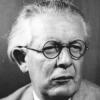Jean Piaget

Jean Piaget
Jean Piagetwas a Swiss clinical psychologist known for his pioneering work in child development. Piaget's theory of cognitive development and epistemological view are together called "genetic epistemology"...
NationalitySwiss
ProfessionScientist
Date of Birth9 August 1896
CityNeuchatel, Switzerland
CountrySwitzerland
self law causes
The self thus becomes aware of itself, at least in its practical action, and discovers itself as a cause among other causes and as an object subject to the same laws as other objects.
philosophy teaching office
It was while teaching philosophy that I saw how easily one can say ... what one wants to say. ... In fact, I became particularly aware if the dangers of speculation ... It's so much easier than digging out the facts. You sit in your office and build a system. But with my training in biology, I felt this kind of undertaking precarious.
action individual abstraction
Reflective abstraction, however, is based not on individual actions but on coordinated actions.
views psychology transition
Our problem, from the point of view of psychology and from the point of view of genetic epistemology, is to explain how the transition is made from a lower level of knowledge to a level that is judged to be higher.
order two geometric
As you know, Bergson pointed out that there is no such thing as disorder but rather two sorts of order, geometric and living.
self world contact
In other words, knowledge of the external world begins with an immediate utilisation of things, whereas knowledge of self is stopped by this purely practical and utilitarian contact.
firsts tasks logic
If logic itself is created rather than being inborn, it follows that the first task of education is to form reasoning.
self games common
Before games are played in common, no rules in the proper sense can come into existence. Regularities and ritualized schemas are already there, but these rites, being the work of the individual, cannot call forth that submission to something superior to the self which characterizes the appearance of any rule.
roots next-level levels
What the genetic epistemology proposes is discovering the roots of the different varieties of knowledge, since its elementary forms, following to the next levels, including also the scientific knowledge.
acquisition accommodations assimilation
Every acquisition of accommodation becomes material for assimilation, but assimilation always resists new accommodations.
practice games adults
As far as the game of marbles is concerned, there is therefore no contradiction between the egocentric practice of games and the mystical respect entertained for rules. This respect is the mark of a mentality fashioned, not by free cooperation between equals, but by adult constraint.
religious children unique
There is little mysticism without an element of transcendence, and conversely, there is no transcendence without a certain degree of egocentrism. It may be that the genesis of these experiences is to be sought in the unique situation of the very young child in relation to adults. The theory of the filial origin of the religious sense seems to us singularly convincing in this connection.
capable creating creativity critical education goal inventive men principal repeating schools simply women
The principal goal of education in the schools should be creating men and women who are capable of doing new things, not simply repeating what other generations have done; men and women who are creative, inventive and discoverers, who can be critical and verify, and not accept, everything they are offered.
actions individual time
On the one hand, there are individual actions such as throwing, pushing, touching, rubbing. It is these individual actions that give rise most of the time to abstraction from objects.